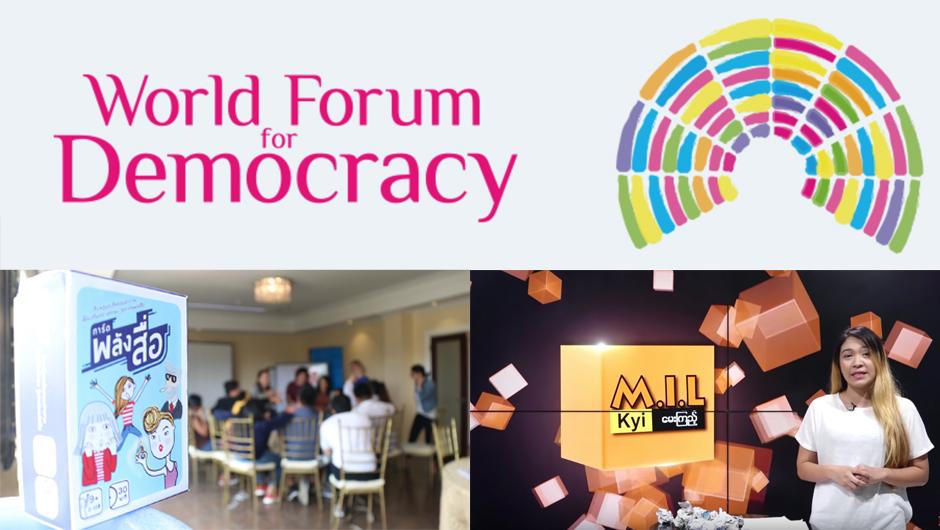#UnitedNationsOfInnovation
FNF programs in Thailand and Myanmar nominated for Democracy Innovation Award
For English please see below.
Die FNF-Büros in Myanmar und Thailand leisten wichtige Aufklärungsarbeit in Zeiten zunehmender Desinformationskampagnen und Zensur: Mit einem Kartenspiel, das Schüler ermutigt, Fragen zu stellen und einer TV-Serie, die zum kritischen Denken anregt.
Beide Projekte fördern einen verantwortungsvollen Medienkonsum – und das auf spielerische und unterhaltsame Weise. Die innovativen Ansätze sind bereits auf internationale Resonanz gestoßen. Die Teams wurden im November 2019 zum World Democracy Forum des Europarats in Straßburg eingeladen, um ihre Projekte vorzustellen.
Die Aufklärungsarbeit ist dringend notwendig. In beiden Staaten ist der über Medien geführte öffentliche Diskurs stark gefährdet. In Myanmars Sozialen Netzwerken verbreiten Extremisten Falschnachrichten und schüren Hass gegen Minderheiten. Die Vereinten Nationen sehen in den Hassbotschaften im Netz einen Katalysator der Rohingya-Krise. In Thailand versucht die Regierung kritische Stimmen als „Fake News“ zu diskreditieren und legitimiert damit Zensur.
Das Kartenspiel von FNF Thailand stellt Situationen dar, die junge Menschen bei der täglichen Mediennutzung erleben. Es fordert die Teilnehmer auf, anhand von fünf Schlüsselfragen die Inhalte von Nachrichten und Botschaften kritisch zu beurteilen. Sie sollen beispielsweise beurteilen: Wer hat diese Nachricht erstellt? Welche Techniken werden eingesetzt, um meine Aufmerksamkeit zu erregen?
"Das Spiel wurde mehr als 600 thailändischen und internationalen Schülern vorgestellt. Wir erhalten weiterhin eine hohe Anzahl von Anfragen von Schulen und zivilgesellschaftlichen Organisationen", sagte Mary Dusadeeisariyakul, FNF Thailand Program Manager.
Das Projekt von FNF Myanmar ist nicht weniger spannend. Gemeinsam mit Partnern hat das Team eine 12-teilige wöchentliche TV-Serie namens MIL Kyi entwickelt. Auf Deutsch übersetzt bedeutet MIL Kyi: „Einfach fragen“. Die Serie liefert Informationen über aktuelle Medienthemen, stellt Falschnachrichten klar und diskutiert mit Experten über Trends bei der Mediennutzung.
MIL Kyi wurde in Zusammenarbeit mit der Myanmar ICT for Development Organization (MIDO) und dem TV-Sender Democratic Voice of Burma (DVB) produziert und ist die erste Fernsehserie zur Medienkompetenz in Myanmar. Jede Sendung erreicht mehrere Zehntausend Zuschauer.
"Facebook wird nicht nur privat verwendet, sondern auch für die politische Mobilisierung genutzt. Indem wir die Medienkompetenz der Menschen stärken, unterstützen wir auch den demokratischen Wandel des Landes", sagt Hnin Wint Naing, FNF Myanmar Executive Program Manager.
Thailand
Myanmar
A card game to teach students to think critically? A television show that encourages people to ask questions? These are innovative formats that FNF Offices in Thailand and Myanmar have initiated to counter fake news.
FNF Thailand’s Media and Information Literacy Card Game and FNF Myanmar’s media literacy TV series MIL Kyi (Just Ask) were designed to raise awareness on the issue of fake news, and fosters responsible media consumption. These two projects will be among the ground-breaking initiatives from all over the world that will be presented at the World Forum for Democracy (WFD) in Strasbourg, France on November 6-8, 2019.
Five key questions in Thailand
FNF Thailand created the Media and Information Literacy Card Game to promote a critical approach to media content. Developed in 2017 with the Thai Media Fund, the card game is intended for primary and secondary students. The game presents situations young people face in everyday life. It provokes participants to thoroughly and critically assess how issues affect their media consumption behavior through five key questions:
Who created this message?
Which techniques are used to attract my attention?
How might different people interpret this message?
Which lifestyles, values, and points of view are represented, or missing?
Why is this message being sent?
“The game has been introduced to more than 600 Thai and international students. We continue to receive a high volume of requests from schools and civil society organizations so that they get oriented on this edutainment tool,” said Mary Dusadeeisariyakul, FNF Thailand Program Manager.
First of its kind in Myanmar
FNF Myanmar designed its Media Information Literacy Project or MIL Kyi, which translates to Just Ask in Myanmar language. MIL Kyi is a 12-episode weekly video broadcast that provides information on media literacy, discusses topical issues, and presents the insights of experts and the public through interviews. Produced in cooperation with the Myanmar ICT for Development Organization (MIDO)and the Democratic Voice of Burma (DVB), MIL Kyi is the first media literacy television series in Myanmar.
“Facebook is not only used for social communication, but also for social and political mobilization. This is why we created a program that goes beyond media literacy, but also supports the overall democratic transition of the country,” pointed out Hnin Wint Naing, FNF Myanmar Executive Program Manager.
FNF as the creative innovation platform
This is the third time that FNF Thailand is participating in WFD. In 2014, it showcased SIM Democracy, a board game that simulates citizens’ roles in a democratic society. In 2015, it presented Dream Thailand, a platform for the youth to voice out their opinion, and for political parties and the government to reach out to the young generation.
FNF Philippines also took part in WFD in 2013, introducing its campaign It’s All About Freedom to a global audience. Its innovative formats, like the Freedom Run, bring civic education outside of the classroom.
WFD is an annual event and a platform for dialogue and democratic participation. Organized by the Council of Europe, the forum deals with challenges facing democracy. This year, WFD addresses the subject of Information and Democracy, looking at how “the volume, content and platforms have evolved beyond recognition in a short period of time.”

